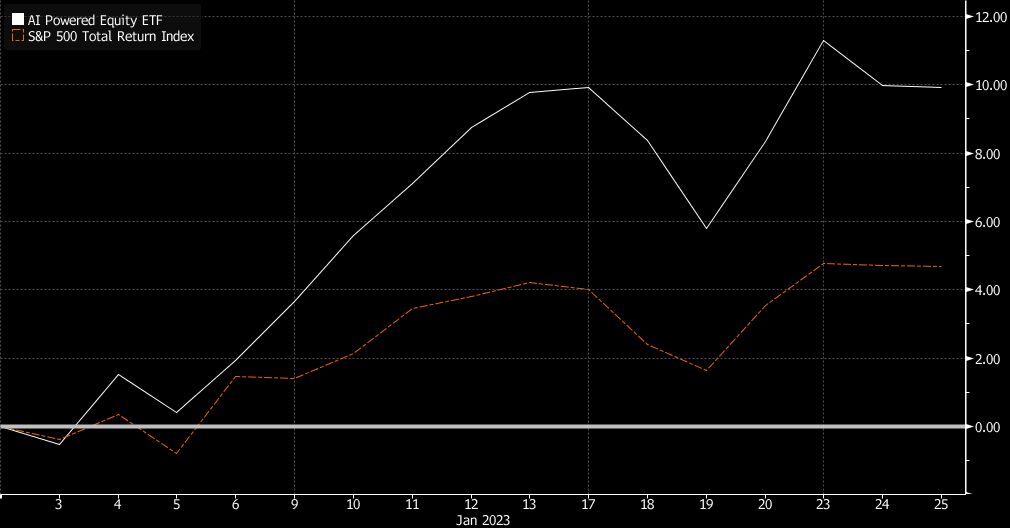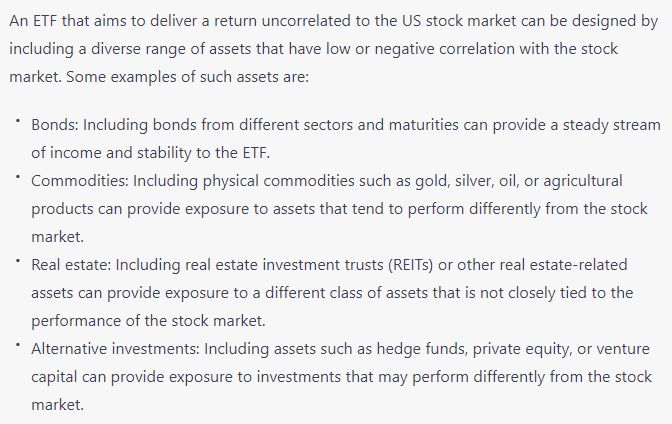We Asked ChatGPT to Make a Market-Beating ETF. Here's What Happened

What happens when you ask the hottest AI tool in the world to design an ETF that can beat the U.S. equity market? It tells you the same thing every frustrated stock manager does.
In a bid to see how close technology really is to replacing Wall Street’s army of analysts, experts and money runners, we challenged ChatGPT, the artificial intelligence tool that’s taking the internet by storm, to create us a winning portfolio for the U.S. stock market.
The result: A classic exercise in fence-sitting, with the tool explaining that the market is too unpredictable to design such a fund, while warning about the need to pick investments aligning with our goals and appetite for risk-taking.
Here was the full response when we instructed ChatGPT to “design an ETF to beat the U.S. stock market and tell us what stocks are in it.”
ChatGPT’s response to our first query.
Score one for the humans. It seems for all the hype, AI still isn’t quite ready to conquer the stock-picking world.
On the other hand, perhaps ChatGPT does know the secret to beating the market, but is intelligent enough not to give it away?
There are already artificial intelligence-guided investments all across Wall Street — including in the ETF arena — and some are beating the market right now.
Case of AIEQ
A current standout is the AI Powered Equity ETF (ticker AIEQ), a $102 million vehicle that has returned about 9.9% in 2023 through Wednesday, compared with 4.7% for the S&P 500 Total Return Index.

AIEQ uses a quantitative model running 24/7 on IBM Corp.’s Watson platform to assess more than 6,000 US publicly traded companies each day. It scrapes regulatory filings, news stories, management profiles, sentiment gauges, financial models, valuations and more.
The product, developed by EquBot LLC and overseen by ETF Managers Group LLC, can be quick to shift holdings and exposure levels, making it a barometer of sentiment for observers.
It entered 2023 with a mixed allocation. Major holdings currently include home furnishing firm RH, Las Vegas Sands Corp., sustainable power company Constellation Energy Corp. and JPMorgan Chase & Co.
Returns analysis shows that the ETF’s consumer discretionary holdings — including shares in the likes of Caesars Entertainment Inc., Kohl’s Corp. and the meme-stock favorite GameStop Corp. — have been the biggest driver of performance this year.
However, expand the time horizon and AIEQ’s market-beating prowess comes undone. Since its 2017 inception, the ETF has handed investors about 41%, according to data compiled by Bloomberg. The S&P 500 Total Return Index has delivered more than 72% in the same period.
“It works best when it can catch on to momentum names in the growth space,” said Jessica Rabe, co-founder of DataTrek Research. “It struggled to find momentum names in a highly volatile stock market last year, and when it’s had the best track record, it’s been during bull markets when it favors tech names.”
So perhaps ChatGPT was wise in refusing to attempt to beat the market. To give it another chance, we asked the tool — like others testing ChatGPT’s capabilities with hypotheticals — to help with a different, never-ending quest of money management: an investment offering clear diversification from the broader market.
ChatGPT’s Design
Here’s what we got when we told ChatGPT to “design an ETF to deliver a return uncorrelated to the U.S. stock market.”

A multi-asset approach, mixing in some alternatives. Not a bad result, according to Eric Balchunas, senior ETF analyst at Bloomberg Intelligence — even if history shows that human investors tend to like their asset classes separate.
“This is straight out of the institutional playbook,” Balchunas said “These are solid recommendations for asset classes that provide non-correlated returns. This is what the majority of institutional investors invest in. It’s clearly read the books.”




